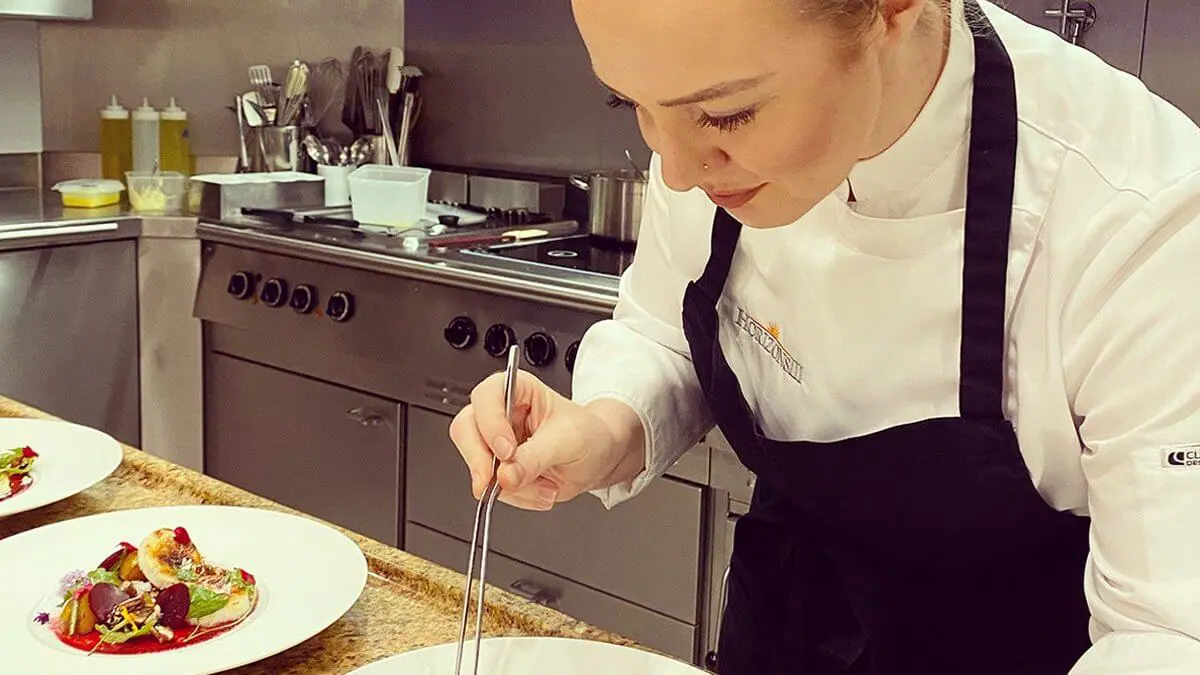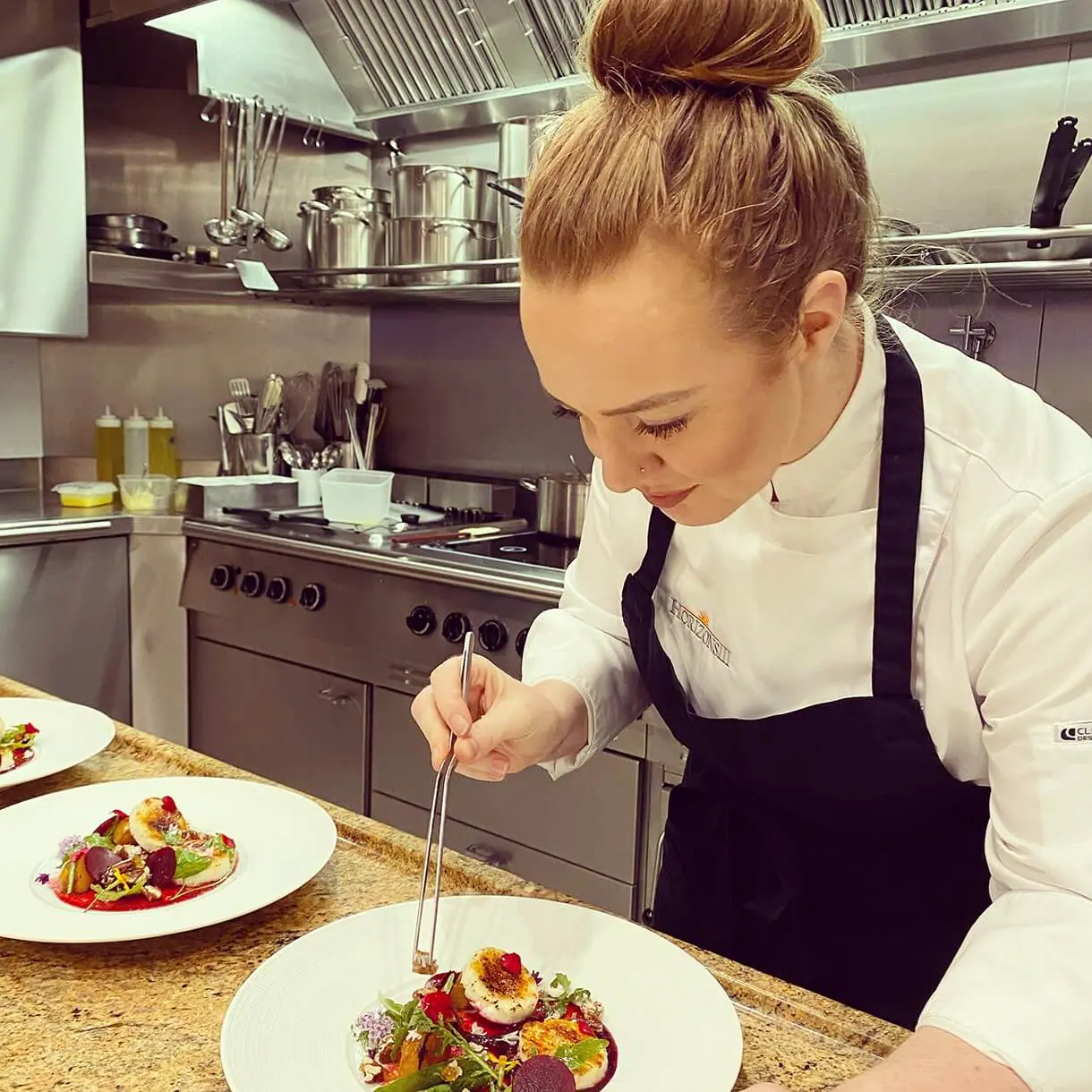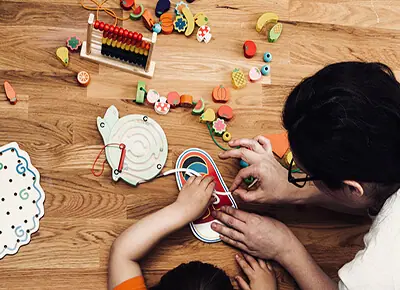INTERVIEW WITH…A SUPER YACHT CHEF

Arguably one of the most challenging jobs onboard, the Super Yacht Chef needs to be creative, innovative, independent, versatile and very, very patient. There is no room for complacency because everything that leaves the galley must be perfect, and it must happen no matter if rough seas shake the pot or the boat is on a remote island in French Polynesia.
The chefs’ core role remains comparable to that on land – cook exquisite meals for guests. A Super Yacht chef, however, not only needs to meet guests’ preferences, allergies, and dislikes, they need to do it for the crew too, and they need to do it differently every single day.
19 London spoke to one of our candidates, Melissa, who shared with us what it is like to be a chef onboard a super yacht and what eager new chefs can expect from a career on the ocean.
Can you tell us a little about yourself, your training, career and background as a chef?
I am Irish, and I’ve been working in the yachting industry for 11 years now. Initially, I took a job as a crew chief and stewardess. I had no formal chef training at the time, but my father was a chef and baker, so I grew up cooking. I fell in love with the galley and returned to culinary school to get proper training. While at school, I staged in several different high ends and Michelin star restaurants such as Chapter One, L’Ecrivan and Pichet in Dublin, Lough Erne in Northern Ireland, and Mark Greenaway in Edinburgh. I did this primarily for free to gain experience. I worked my way up from there and spent a year in Australia working in the incredible Sydney opera house for Celebrity Chef Peter Gilmore; I also helped run Rosie’s in Coogee, Sydney. Once I had a goal in mind, it was easy to chase.
How has Covid-19 changed the way you work in the kitchen?
It hasn’t really changed the way I run the galley. In the beginning, we wore masks, which was tough to wear all day in the kitchen’s heat, but we’ve always followed strict HACCP guidelines, so the cleanliness and hygiene practices that were already in place were effective.
From Michelin star restaurants to serving ultra-high net worth clientele onboard luxury multi-million euro vessels, please share some of your career highlights with us.
Hmm…I’m not sure how much I’m allowed to say as we all generally sign several NDA’s.
One highlight is working for one of the world’s best and most respected musicians. He was a true gentleman and probably the only person I’ve been star-struck meeting! We cooked for Barak Obama and the world leaders at the G8 summit, which was held in the 5-star hotel I was working at in Enniskillen. I worked at Chalet La Bergerie in the French alps, which at the time was one of the most exclusive chalets in the world. Some other highlights include the places we’ve had the opportunity of visiting. Catching fish in various parts of the world from the back of the boat, namely the Caribbean and Iceland, really are things you’ll never forget.
What does an average day look like when you are on charter?
In one word? Long. And it all begins before the charter even starts. We are required to provision in sometimes the most remote places in the world yet the guests will still expect the same quality products. This can prove to be complicated with getting things such as fresh white truffles from Alba only available from September to December, French foie gras, caviar flown in from Paris, specialized meat and fish from Japan. The list is never-ending, and there’s no expense spared when it comes to the boss. On charter, my day begins early doors, maybe 5.30am. I wake up and bake several different types of breads. I then get straight into the guest breakfast preparations and then crew. The mornings are always the busiest and most productive. If you plan that well, then it should make the rest of your day a little easier.
During guest breakfast and the various ‘a la Carte’ requests, you are preparing lunch, elements of their dinner, canapés and afternoon tea or snacks. Lunch may go out at lunchtime, and it may go out on the hour every hour for just two people at a time. You never know – you just need to be patient and organized.
The galley is also putting out crew food at this time. From my experience, it’s been myself and a sous chef serving the guests and 22 crew for lunch. The galley then gets a complete clean down, and I will send the sous on a break and probably get working on tomorrow’s sourdough and some dessert prep. If there’s time, I’ll take a short break.
We then prep and serve crew dinner at 6 pm, which is quickly followed by guest canapés generally at 7 pm and going straight into guest dinner service. Dinners can be family-style large buffets or tasting menus. It varies for each client.
This is all taking into account the day runs as we hope (which it rarely does). Sometimes we have severe weather and need to move the yacht during service, which can be really challenging as you are prepping, cooking and serving with 50knots of wind blowing – your knife skills better be up to par, or you may struggle! After dinner service, the galley is cleaned again, and then I prep for breakfast the following day. Preparing pastries, making sure bread is proving. Sometimes guests would like midnight snacks. These are very long days and not for the faint-hearted. Sleep a little, get up, and repeat.
What qualifications and characteristics does someone need to become a Super Yacht chef?
A culinary degree is preferred but not always essential. I didn’t go down the traditional route; I returned to school after starting to work. However, personally, I learned much more working in the restaurants under some great influential head chefs. Learning on the job is a lot more effective and beneficial. As a yacht chef, you need to complete a ship’s cook certificate, a four-day exam that tests your savoury, butchery, sweets, pastry, and bread skills. For the less experienced chefs, this can prove to be very challenging. You must also complete a basic health and hygiene course.
I would say the main characteristics would be patience, patience and patience. You may have the perfect risotto prepared, and then guests change their mind 5 minutes before and decide they’ll sit 25 minutes later; you’re now making that risotto again from scratch! I think creativity, patience and passion are vital to a chef role onboard.
Can you tell us, in your opinion, the difference between being a land-based and yacht-based chef? Are there challenges or rewards specific to one or another?
It’s a whole other world. In a land-based role, you generally have a team of chefs around you and cook the exact same dishes every day. This enables you to perfect that dish. On a yacht, you have to be incredibly creative, preparing different meals every day. You’re provisioning in remote parts of the world, and you have to really adapt to your surroundings. Often ingredients you want or need are not available, and you need to be very flexible. You’ll be washing your own dishes, ordering your own provisions, doing your own prep- that makes you KP, Commis Chef and Head Chef all in one.
What traits would you look for when hiring a sous chef or crew cook to assist you in the galley?
Passion and a great personality. Someone that enjoys what they do. Being in the galley for up to 17 hours a day together, you want someone that you get along well with. A positive attitude and a will to learn. Experience is a bonus, but you can teach someone with a good attitude.
What inspires you to continue working in such a high profile environment?
The same reasons I started. The travelling, the incredible people you come across, and the salary isn’t too bad either! I feel really lucky to have stumbled across this industry and have spent the last 11 years travelling to the most incredible destinations worldwide. Some highlights include Ice caving in Iceland, diving in the Caribbean, sailing in St Barth’s bucket sailing Regatta, kayaking through the gators in Florida, attending the Monaco Grand Prix, truffle hunting in n southern Italy… the list goes on!
How do you find the time to learn new techniques and grow as a Chef?
I try and send myself to at least one stage every year. I’m constantly reading books and following various chefs I admire on social media to see what they do. A stage is when you go and work for free in a restaurant to learn certain dishes you are interested in from that chef.
How do you maintain a work-life balance when you live where you work?
You don’t. Haha. It isn’t easy, to be honest. It’s hard to turn off; even when the boss isn’t on board, there’s still always something to do, especially if you are in ahead of department role. I try to practice yoga, meditate and work out a few times a week, and a few drinks with the crew always helps.
If you could give young aspiring Chefs valuable career advice, what would you say?
Find a chef you respect and admire and go and work for them. Don’t try and get out on your own too quickly. There’s nothing wrong with slowing down and learning before attempting to do everything yourself. Walk before you run.
To work on a yacht, get yourself together before you start searching for work. Get your certification and then start applying to agencies. There are several good agencies, such as 19 London, where you can upload your CV online and speak to recruiting agents about current chef or cook roles. Get your food pictures and menus up on social media. It really helps recruiters and captains get a good feel for your style and your experience.
As a private chef, what are some personal challenges you face?
Trying to figure out new dishes every day, especially taking into account food dislikes and intolerances. It can become challenging serving 13 dishes at lunch and another 13 at dinner and cooking for the same people every day. The menu is always expected to change- and there are only so many dishes out there!
It’s much easier when working as part of a team in the galley as you can bounce ideas off each other, and it really can help your creativity. The other side of that is just living at work in general. You are on call 24/7 no matter what the guests would like to eat. If that is a chocolate cake at 4 am, you are up baking in the middle of the night. You may then need to stay up, start baking bread and continue through to breakfast service, possibly past lunch without a break. It can be very demanding, physically and mentally.
If you had one hour starting now, what would you prepare for us?
Well, not sushi or anything of great substance! If I wasn’t given any preferences and depending on where we are in the world, I’d probably go safe with a Mediterranean buffet, a simple fish dish, a few nice salads, some steaks and a quick and easy starch. Light and easy with plenty of fresh herbs and citrus.
What new and exciting culinary techniques do you think will be trending in the coming year?
I think people are really dialling back still. The flexitarian movement is still going strong, which is great to see, and it’s nice to see big names like Daniel Humm doing a full vegan menu. Given the pandemic’s restrictions on many countries, it would be nice to see chefs using more local ingredients and not relying on imports.
Are you expected to always cook and family gatherings?
Absolutely not. Haha, they know me better than that. I try and stay out of the kitchen for a few weeks while on holiday; however, I don’t think I’d let them cook something big like Christmas dinner. I would want to be in control of that.
If you could give your younger and inexperienced self three career tips, what would it be?
Keep working for a good head chef without rushing out to work on your own, learn to ask for what you’re worth, not just accept what you’re offered and believe in yourself; you’re better than you think.
Our team at 19 London provides the highest calibre crew to the industry’s most prestigious super yachts. If you are a candidate looking for your next position, or a client looking to hire a private household or yacht chef, please contact us today.




